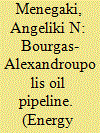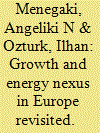| Srl | Item |
| 1 |
ID:
103388


|
|
|
|
|
| Publication |
2011.
|
| Summary/Abstract |
This paper employs Muthoo's bargaining principles/prerequisites for an effective bargaining result (Muthoo (2000). A Non-Technical Introduction to Bargaining Theory, World Economics 1(2): 145-166) to decide whether Greece and Bulgaria can form a successful energy coalition. Motivation for this is the proposed construction of the crude oil pipeline from the Bulgarian port Burgas to the Greek Aegean port of Alexandroupolis. The reason Turkey is the third country in the analysis despite its current non-membership in this venture, is that: (i) Turkey offers to host a competitive route of the pipeline, (ii) It is a transit, neighboring country to Greece forming an important geopolitical triangle together with Greece and Bulgaria and (iii) co-operates separately with Bulgaria and Greece in other energy pipelines. Therefore, the three countries engage to interwining energy and geopolitical futures. Whether B-A oil pipeline will be implemented or not, will be due to a mix of bargaining procedures. The paper shows that Muthoo's principles/prerequisites for an effective bargaining result, through their constituents (selected economy and energy figures and characteristics), are fulfilled by Greece and Bulgaria. A broader coalition with the inclusion of Turkey might also be permissible and promising based on this theory.
|
|
|
|
|
|
|
|
|
|
|
|
|
|
|
|
| 2 |
ID:
125591


|
|
|
|
|
| Publication |
2013.
|
| Summary/Abstract |
This is an empirical study on the causal relationship between economic growth and energy for 26 European countries in a multivariate panel framework over the period 1975-2009 using a two-way fixed effects model and including greenhouse gas emissions, capital, fossil energy consumption, Herfindahl index (political competition) and number of years the government chief executive stays in office (political stability) as independent variables in the model. Empirical results confirm bidirectional causality between growth and political stability, capital and political stability, capital and fossil energy consumption. Whether political stability favors the implementation of growth or leads to corruption demands further research.
|
|
|
|
|
|
|
|
|
|
|
|
|
|
|
|